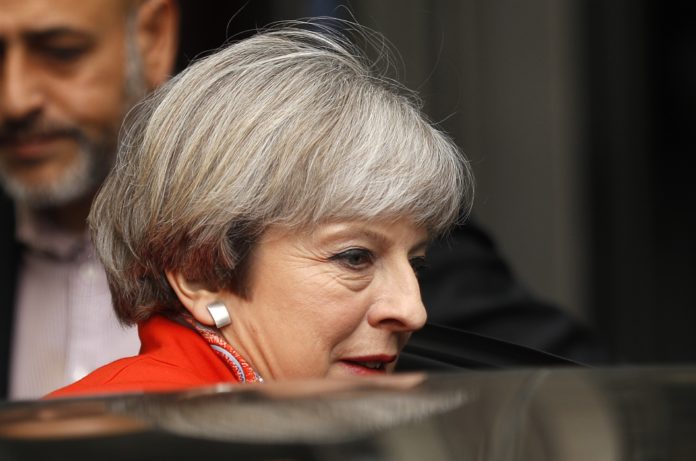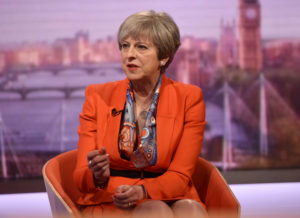
By William James and Alastair Macdonald
LONDON/BRUSSELS (Reuters) – British Prime Minister Theresa May expects divorce talks with the European Union to be tough, she said on Sunday after EU leaders agreed stiff terms and voiced alarm at “illusions” in London that may wreck a deal.
“What this shows, and what some of the other comments we’ve seen coming from European leaders shows, is that there are going to be times when these negotiations are going to be tough,” May told the BBC a day after her EU peers agreed on demands they want met to avoid chaos when Britain leaves the bloc in 2019.
At Saturday’s Brussels summit of the 27 other EU states, EU chief executive Jean-Claude Juncker accused unnamed pro-Brexit figures of underestimating the complexity of the task and German Chancellor Angela Merkel repeated her concern that London still harboured “illusions” about negotiating a quick free-trade pact.
May, who has called an election for June 8 in the hope of strengthening her position, repeated her insistence that no deal would be better than a bad deal — a position many in Brussels view as bluff, arguing that the legal void that would dawn on March 30, 2019, would hurt Britain much more than the others.

But Juncker, quoted on Sunday by Germany’s FAS newspaper, highlighted growing fears that the two sides are talking past each other, raising a significant risk of negotiations collapsing.
“I’m leaving Downing Street 10 times more sceptical than I was before,” the Frankfurt paper quoted the European Commission president as saying after he and chief EU negotiator Michel Barnier met May in London over dinner on Wednesday.
Juncker had arrived hefting two weighty EU treaties — last year’s 1,600-page CETA free-trade pact with Canada and the 2012 EU accession of the bloc’s newest member, Croatia (population 4.2 million). They were props to convince May of the complexity of unwinding 46 years of EU membership and keeping trade open.
So alarmed was he at what he said on Saturday were British officials who “underestimate the technical difficulties” that he alerted Merkel, the EU’s main power broker, in an early morning call to Berlin on Thursday. She then used a speech in parliament to warn against British “illusions” that it could retain much of the benefits of EU membership after Brexit.
READY OR NOT?
Brussels is also concerned about the level of preparedness in London for talks that are due to start after the June 8 vote and which Barnier says need to be essentially wound up within 16 months to ensure ratification ahead of Brexit in March 2019.
Barnier briefed leaders on his concerns, Austrian Chancellor Christian Kern told reporters.
“The Commission and Barnier … have really done their homework well,” Kern said. “One can say that the British have not done so with the same intensity.”
EU officials said they were still unsure who would conduct the negotiations with Barnier’s team, saying that May had told Juncker that she herself would be in charge.
That, EU officials said, left it unclear who would actually be taking the many decisions required during months of day-in, day-out talks in Brussels over the coming two years. British Brexit Secretary David Davis has been expected to take a lead.

Asked about her insistence that no deal would be better than a bad one, May told ITV television: “I wouldn’t have said it if I didn’t believe that.”
She added: “With the right strong hand in negotiations, we can get a good deal for the UK.”
May, who came to power after Britons decided last year to leave the EU, called the election to win a public mandate and a bigger majority to help to execute her plan to leave the EU’s single market and pursue a free-trade deal with the bloc.
EU leaders took only minutes to approve a negotiating mandate for Barnier that includes a readiness to walk away from a deal and emphasises the unity of the 27 as an absolute priority.
The Belgian prime minister warned colleagues against falling into a “trap” set by British negotiators trying to divide them, while others cautioned May that it was in Britain’s interests, too, to avoid that, since a disunited 27 might mean no deal.
Irish Prime Minister Enda Kenny, however, struck a note of realism when he conceded that Saturday’s harmonious mood would not survive in the long run.
“When the negotiations start and detailed, more complex discussions have to take place, obviously some countries will assign bigger priorities to different issues,” Kenny said.
“So,” he added with a smile of understatement, “it won’t all be as calm and as measured as today.”
(Editing by Elizabeth Piper and David Goodman)








